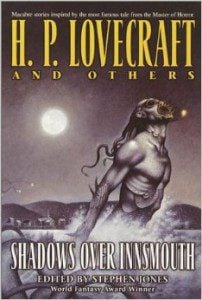
Photo by Lucius B. Truesdell/Public Domain
The moniker “weird fiction” is associated with H. P. Lovecraft. He’s considered the font of the genre by some. But when you look at it, it is a little weird.
I’m off to NecronomiCon tomorrow–the convention in H. P.’s honor that is conducted in Providence, Rhode Island each summer. I’m looking forward to it. (I’m covering it for Scenes Media.) And while H. P. and I disagree about many things, I find him a sympathetic figure and I’ve enjoyed many of his stories. (I’ve even written about him, here, and here.)
He coined a term for his aesthetic: cosmicism. Although Lovecraft died in the way a true starving artist should (essentially starving to death for his art), he has prospered posthumously. He’s had a huge influence on some pretty significant writers, including Neil Gaiman, Stephen King, and China Miéville. (Impressive!)
H. P.’s militant atheism is well known, it is even intrinsic to his aesthetic. So it may strike you as a little weird that I could recommend reading Lovecraft to people. But I do. (If you’ve read this blog in the past you know that not only am I a theist, I’m a conservative one.) Here’s why: Lovecraft can help you develop a taste for the weirdness of God.
Contemporary Christianity is so saccharine it’s cloying. This Sunday past I read William Blake’s, The Lamb, and then I read The Tyger to my congregation during my sermon. The combination had the desired effect.

Occasionally I’ve wondered aloud whether or not contemporary Christianity’s inability to live with The Tyger isn’t driving some people away. People long for an honest account of hard truths. More than that, I think many people know this vast cosmos we live in couldn’t have been made just for us. People are looking for Others to populate the inhospitable regions. And this is what Lovecraft gives them: weird beings in the sense of alien and uncanny things. His fiction is intended to reveal to the reader that reality is not all about you and me.
But that can be seen in the Bible in those seldom preached upon passages in Ezekiel, or Job, or even the Psalms. In those places we see all sorts of weird, uncanny things. And the weirdest being of all is God. He is Wholly Other and utterly weird. This is the God of the whirlwind, who dwells in thick darkness, who is so radioactive you drop dead just by getting too close. He is so overwhelming he is as crushing as Niagara Falls, only more so–infinitely more.
When I bring this up to the Lovecraft cultus his denizens retreat to Blake’s Lamb. They even hug their plush Cthulhu dolls a little tighter. This is a little too weird for their taste. I think they want their weirdness without a price. But even that’s a little weird when you look at it.
This brings me to another reason I recommend Lovecraft to you. H. P. can help us recover the doctrine of Providence. The reason is the word “weird” actually has a connection to providence. (How providential is that?) Here, in case you don’t believe me, is the etymology of weird. (I’ve taken it from the online dictionary of etymology.)
weird (adj.)
c. 1400, “having power to control fate, from wierd (n.), from Old English wyrd “fate, chance, fortune; destiny; the Fates,” literally “that which comes,” from Proto-Germanic *wurthiz (source also of Old Saxon wurd, Old High German wurt “fate,” Old Norse urðr “fate, one of the three Norns”), from PIE *wert-“to turn, to wind,” (source also of German werden, Old English weorðan “to become”), from root *wer- (2) “to turn, bend.” For sense development from “turning” to “becoming,” compare phrase turn into “become.”
The sense “uncanny, supernatural” developed from Middle English use of weird sisters for the three fates or Norns (in Germanic mythology), the goddesses who controlled human destiny. They were portrayed as odd or frightening in appearance, as in “Macbeth” (and especially in 18th and 19th century productions of it), which led to the adjectival meaning “odd-looking, uncanny” (1815); “odd, strange, disturbingly different” (1820). Related: Weirdly; weirdness.
It isn’t just feeling weirdness from a distance that we see in Lovecraft. His protagonists feel the weirdness up close. They fall into the tentacles of an indifferent Cthulhu. And it changes them.
I can’t help but see the shadow here of the true horror the mysterium tremendum: to be subject to a God you cannot fathom or control. Who leads you darkly around bends and twists that disorient. This is the providence we see with Jonah, Job, and Joseph. Lovecraft, it has always seemed to me, is Calvinism without the consolation, William Cowper without hope.
For people who are looking for something really terrifying, but in the best way imaginable, Lovecraft can serve as a gateway drug.











